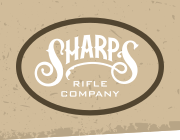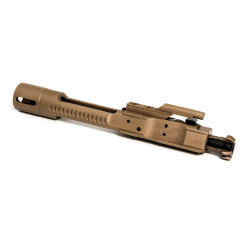What is a Bolt Carrier Group (BCG)?
Everyone with an even passing knowledge of the AR-15 platform knows that the bolt carrier group is one of its most critical components. But what exactly is a BCG and how does it function?
The BCG is the part responsible for loading a new bullet into the chamber, firing that bullet with the help of the firing pin and then ejecting the spent casing. The gas released in the process spins the bolt inside the carrier, meaning another round is ready to be fired.
This whole process involves high pressure, high temperature and a lot of moving parts, making it easy to understand why the reliability of the AR15 largely depends on the design and durability of the BCG.
Different types of Bolt Carrier Groups (BCGs)
Essentially, bolt carrier groups can be separated into 3 main types:
- Full auto
- Semi auto
- Low mass
Full Auto Bolt Carrier Groups
Full auto (or M16-style) BCGs are designed to be used by military and law enforcement but they don't automatically make a rifle automatic. In fact, all that means is that the BCG is a bit heavier, which actually increases the reliability of the carrier. Most BCGs on the market today are full-auto ones.
Semi Auto Bolt Carrier Groups
Semi-auto BCGs have an extra cut at the bottom of the tail which increases the cycling rate. For this reason, these types of BCGs are preferred for sporting competitions.
Low Mass Bolt Carrier Groups
Low mass (or lightweight) BCGs are usually designed of lighter metal alloys allowing to shed as much of the weight as possible. While this increases the cycle rate of the rifle even more, it usually impacts accuracy and thus requires a more skilled shooter.
BCG Coatings and Why They Matter
Bolt carrier groups are offered in different types of coatings (finishes), but do they make any difference or is it just there for show? Sharps BCGs come with a few different coatings and our choice has been carefully made. Let's have a look.
- Diamond Like Carbon (DLC) is the most commonly used coating for our BCGs. This is a very solid coating that prolongs the life of your carrier by protecting it from corrosion. It also has an extremely low coefficient of friction making for a smooth shooting and a no-hassle cleaning.
- Nib-X coatings are made out of a nickel boron alloy which give the carrier a silver and shiny look. Nib-X carriers are slick to the touch and prevent soot deposits. Cleaning is as simple as wiping any dirt off.
- NP3® - our Relia-Bolts™ are all coated in NP3®, an electroless nickel-based finish. This process co-deposits sub-micron particles of PTFE (polytetrafluoroethylene), commonly known as Teflon™, for self-lubricating corrosion resistance.
Bolt Carrier Groups from S7 Tool Steel
S7 has excellent shock absorbing properties which provide superior impact resistance when being utilized in the construction of Bolt Carrier Groups. S7 demonstrates high strength and toughness as well as a resistance to softening at moderately high temperatures, i.e. operating temperatures not exceeding 1000°F.
The properties we as shooters look for in an AR platform BCG, are hardness and wear resistance. S7 provides such attributes when heat-treated properly. Sharps has found that the key benefits from S7 tool steel are higher tensile strength and toughness which translate to longevity of use, i.e., a higher number of cycles the bolt can handle before it fails.
Sharps BCGs vs. Mil-Spec BCGs
Here at Sharps we pride ourselves on going beyond Mil-Spec carriers in terms of the materials we use and the overall reliability of our BCGs.
This has been confirmed time and again, including by independent test such as the one carried out by the Ballistic Edge. They put Sharps BCG under different unfavorable conditions (dry bolt without lubrication, over-lubricated bolt, mud, coarse sand and fine dust) and compared their performance with that of several different Mil-Spec BCGs.
Under all conditions, the Xtreme Performance Bolt outperformed Mil-Spec BCGs, with an improvement in the average malfunction rates of between 45% and 60%.



